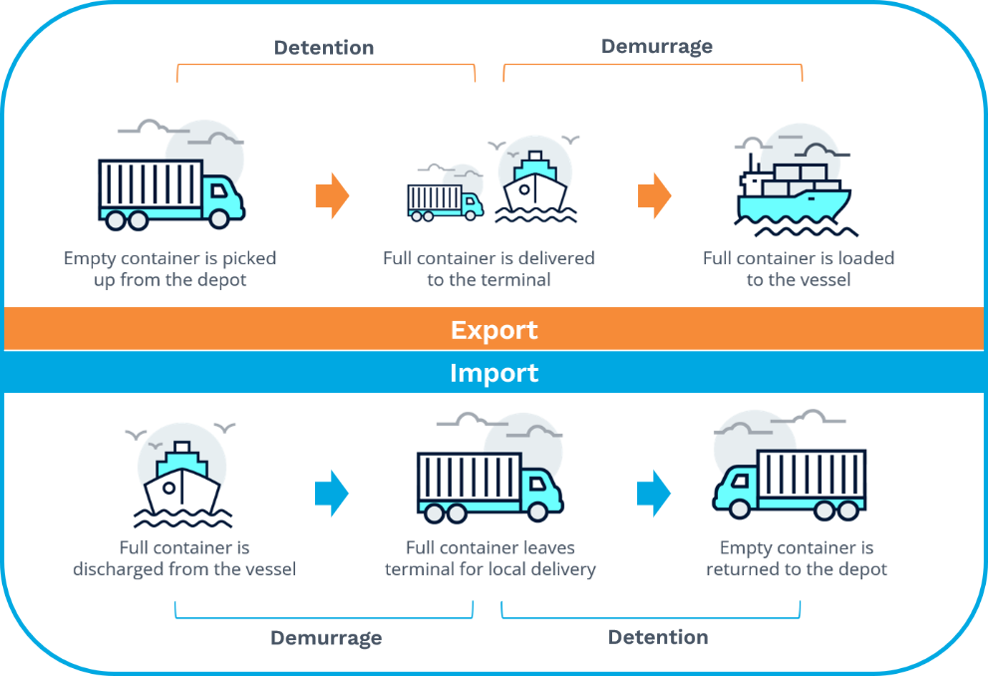Demurrage and detention charges often go unnoticed in ocean shipping, yet understanding them is crucial. By recognizing these distinctions, you can avoid extra expenses and enhance your supply chain’s efficiency. This article covers everything you need to know about demurrage and detention, offering tips to minimize these costs and optimize your supply chain operations.
Free Time
Free time refers to the period during which a carrier allows its customers to use port facilities and containers for activities such as arranging pickup, delivery, or further transportation without incurring any charges.
Demurrage
Demurrage is a fee charged by the carrier if buyers don’t pick up their container from a port or terminal within the allotted free time. Ports can offer a certain number of free days
For example, if the container arrives in Amsterdam on April 8th and the buyer has 7 days of free storage, he must retrieve the container by April 15th. If the buyer collects the container on April 20th, meaning it stays at the port for 12 days in total, the 5 days beyond the free time allowance (from April 16th to April 20th) will incur demurrage charges.
Detention
Detention is another fee imposed by the carrier if the container is not returned to the container yard/depot within the agreed time frame.
For example, imagine a buyer receives a container of goods and takes it to their factory. They keep the container for 14 days to unpack it before bringing it back to port. If the shipping line allows only 10 days free time for the return of the empty container, then the buyer will incur detention charges for the additional 4 days.

Demurrage and detention fees vary based on the carrier, terminal, and contract agreements, typically ranging from USD 75 to USD 300 per container per day.
For instance, if you are shipping 12 containers and delay picking them up by 7 days, with demurrage charges set at $150 per container per day, the total demurrage fees would amount to $12,600. Such charges can significantly impact your financial outcomes.
How to Avoid Demurrage and Detention Charges
- Plan Ahead: Coordinate with your logistics service provider and ensure all necessary documentation and arrangements are in place well before the cargo arrives at the port.
- Know Your Free Time: Understand the free time allotted for your cargo at the port or terminal. This includes both demurrage (for holding containers at the terminal) and detention (for keeping containers outside the terminal).
- Monitor Shipping Schedules: Stay updated on vessel schedules to ensure your cargo arrives at the port when there is available space for unloading.
- Clear Customs Quickly: Ensure all customs paperwork is complete and accurate to expedite clearance.
- Arrange for Timely Pickup: Once the cargo is ready for pickup, schedule transportation promptly to avoid containers lingering at the port or terminal.
- Negotiate Terms: If workable, work out the terms with your logistics service provider such as extending the free times or negotiate waivers for demurrage and detention.
- Utilize Storage Facilities: If you anticipate delays in transporting cargo from the port, consider using nearby storage facilities to avoid accruing demurrage charges.
- Be Flexible with your Warehouse Schedule: Sometimes adjusting the warehouse hours or accepting drop-offs can help you meet or beat the container’s last free day. Temporarily moving the container to a storage facility will still incur costs.
- Stay Informed: Regularly check for updates on regulations and policies related to demurrage and detention to ensure compliance and avoid unexpected charges.
- Work with a Reputable Logistics Provider: Entrust a reputable logistics service provider to manage your shipping needs. Using a provider like Dimerco, instead of dealing directly with a trucker, can be beneficial. They are experienced in making the necessary arrangements to avoid or minimize demurrage and detention fees.
- Consider Shipper-Owned Containers (SOC): When you own your containers, you control their use and timing. You can choose to buy or lease containers depending on what you need. SOCs allow you to use containers more efficiently, helping you avoid extra charges for delays.
Demurrage and detention charges often get overlooked in ocean shipping. Following these tips on how to avoid demurrage and detention charges can save you money and make your supply chain run smoother. Are you shipping goods by sea? Start a discussion with Dimerco and chart a path to reliable global shipping.
